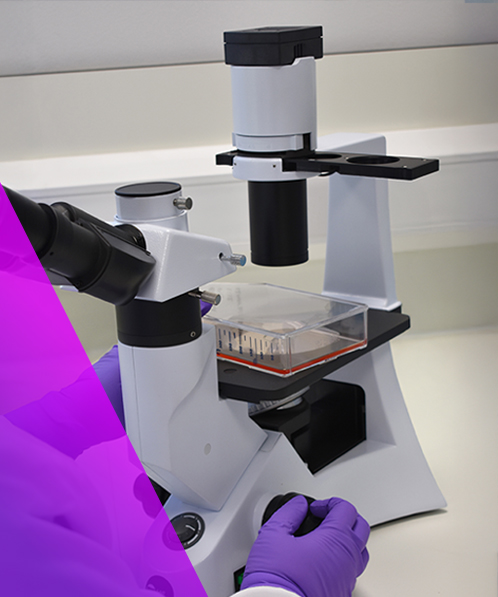Biocompatibility Testing Services in the UK
Supporting safe, compliant medical devices through in vitro biocompatibility assays, including ISO 10993
ISO 10993 In Vitro Biocompatibility Assays
Our biocompatibility testing services support manufacturers in developing safe and compliant products through reliable biocompatibility testing for medical devices. Using customised in vitro biocompatibility testing methods, we help minimise, replace, or de-risk expensive animal studies while supporting ISO 10993 biological evaluations and regulatory submissions.
As an experienced ISO 10993 testing lab in the UK, Virologica works with a wide range of cell lines suitable for cytotoxicity, irritation, sensitisation, and related assays. A selection of our commonly used cell lines is listed below, and we can adapt or customise assays to suit your product. Please contact us if you require a specific cell line not shown.

Commonly Used Methods
ISO 10993-5
Biological evaluation of medical devices – Tests for in vitro cytotoxicity
Cytotoxicity assays are used to determine whether a product will inhibit cell growth or cause cell death. ISO 10993-5 describes methods for assessing the cytotoxicity of medical devices. L-929 cells are often used for this test, although it can be adapted for other cell lines. The cells are prepared as a monolayer and the product is either applied to an agar overlay or a leachate is prepared which is applied directly to the monolayer. The end point of this assay can be qualitative or quantitative.
Required cell line: L-929 or other suitable cell line
Contact time: At least 24 hours
End point: MTT or Microscopy
Pass criteria: ≥70% or ≤ Grade 2
OECD 439
In vitro skin irritation – Reconstructive human epidermis test method
OECD 439 is used for the hazard group identification of irritant chemicals in accordance with the UN Globally Harmonized System of Classification and Labelling (GHS) in Category 2. Reconstructed human epidermis is exposed to the test substance, following exposure cell viability is measured quantitatively. Irritant test substances are identified by their ability to decrease cell viability below defined threshold levels.
Required test system: Reconstructed human epidermis (RhE) model
Exposure time: 15 to 60 minutes
End point: MTT
Criteria to classify non-irritant: ≥50%
ISO 10993-23 (non-regulatory)
Biological evaluation of medical devices – Tests for irritation
ISO 10993-23 details the assay for determining the potential for medical devices to cause irritation using reconstructed human epidermis. Although the standard advises data for regulatory submission should be collected under ISO/IEC 17025 or GLP conditions, Virologica can support with this testing for early screening or development purposes.
Required test system: Reconstructed human epidermis (RhE) model
Contact time: 18 or 24 hours
End point: MTT
Criteria to classify non-irritant: ≥50%
USP 87
Biological reactivity tests – In vitro
USP 87 details test methods designed to determine the biological reactivity of mammalian cell cultures following contact with elastomeric plastics and other polymeric materials with direct or indirect patient contact or of specific extracts prepared from the materials under test n our professional laboratory environment. Three tests are described – agar diffusion test, direct contact test and elution test. The appropriate test method is selected based on the nature of the sample, the potential site of use and the nature of use. The biological reactivity is rated on a scale of 0 to 4 qualitatively.
Required: L-929 or other suitable cell line
Contact time: 48 hours
End point: Microscopy
Pass criteria: ≤ Grade 2
For trusted biocompatibility testing and ISO 10993 support, contact us today. Our specialists are ready to help with project planning, test selection, and regulatory compliance.
Email: [email protected] | Phone: 01925 909090
FAQs
What are biocompatibility testing services?
Biocompatibility testing services evaluate if medical devices are safe and non-toxic for human use as per ISO 10993, OECD, and USP standards.
Why is biocompatibility testing required for medical devices?
It ensures medical devices won’t cause harmful effects like irritation, cytotoxicity, or immune reactions, meeting strict regulatory standards.
Which biocompatibility tests does Virologica offer?
Virologica offers ISO 10993-5 cytotoxicity, OECD 439 skin irritation, USP 87 reactivity, and customised testing per device needs.
Do you provide ISO 10993 testing in the UK?
Yes, Virologica specialises in ISO 10993 testing in the UK for full biological evaluation of medical devices and materials.
How long does biocompatibility testing take?
Testing time varies by product type, but Virologica ensures fast turnaround with expert analysis and regulatory support.
Can Virologica assist with regulatory submissions?
Yes, we provide post-test regulatory support, including documentation, risk analysis, and expert advice for global submissions.
Start The Conversation
Contact us today to explore how we can support you with your next project.